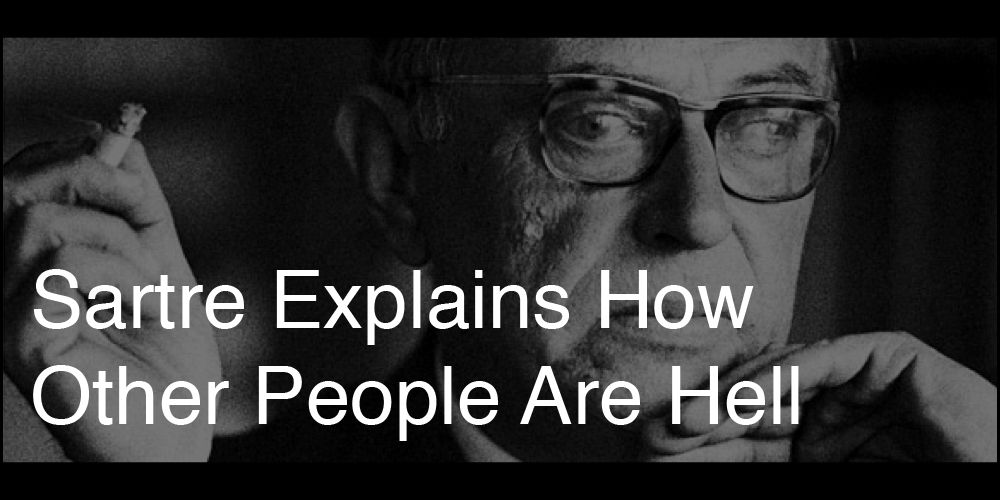
Sartre's thoughts on our encounter with the Other is found in a section entitled "The Look" in Being and Nothingness, and is dramatized in his play No Exit. In Being and Nothingness (pp.252-265), Sartre begins from the premise (opposite Husserl and Merleau-Ponty) that, for the most part, we fail to see Others whom we encounter casually in public as anything other than objects. It's only upon reflection that we realize that the voice we hear is probably not a record player, nor is it probable that the man we see walking down the street is a robot. So then, what happens when we make the realization?
A Subject Sees An Other, A Transcendent Being That Exhibits Distance-Less Spatiality
Sartre gives us a phenomenological narrative, detailing the encounter with an Other from the perspective of the subject: Unlike objects, this Other exhibits a "distance-less spatiality" because they are absorbed in the world of their concern. What Sartre means by this is that, while our relation to objects is primarily spatial (they are this and thus distance relative to our position), the other is there in a non-spatial way, absorbed in the world of their concern. They are there for us as soon as we notice them as an Other, yet we need not be there for them. The might as well be very far away in a way that defies the spatiality to which objects are tied (they are said to be "in" space in a way subject cannot be said to be).
Another example that Sartre gives us is that of how the green grass "offers another face" to the Other, an experience of that green to which the subject in Sartre's account does not have access. That is, the other may be looking at the same grass as you, but what their experience of that grass may be, of its color, is not one to which you have direct access. You only have access (of sorts) to your own experience, and cannot assume to know the Other's perspective.
In stating this, Sartre is purposefully going against his predecessor Husserl who assumes that the Other's experience is accessible and transparent because both are subjects. Quite clearly, Sartre rejects this assumption - just because both you and the Other are subjects doesn't also mean that you share the same subjectivity. The world that had been there for Sartre's hero-subject, organized around his intentionality, now springs a leak in the form of the Other.
Even if the stranger is absorbed in a book, Sartre explains, simply apprehending the other as a present presence (i.e., the Other as a subject, as transcendent being) effects this shift. To further illustrate his meaning, Sartre now turns to the perspective from which we not only see another, but we see them seeing us - "the Look" after which Sartre names this section. What follows is one of Sartre's most well-known descriptions:
A Subject Sees The Other Seeing Them - The Look
Interestingly, at this point in the narrative, the subject suddenly becomes Sartre himself! And our hero Sartre, moved by jealousy, curiosity, or vice (we normally call it voyeurism), crouches down to peep though the keyhole of a door. He does so without reflecting on what he is doing; he is simply following his drive to see what is going on on the other side. Then he hears footsteps behind him and realizes that he is being seen by an Other. Sartre characterizes this encounter being like two mirrors facing each other -- infinity opens up as you see the other seeing you seeing them seeing you seeing them...
Caught, Sartre feels shame, but this is not what we colloquially refer to as shame. It is an existential shame felt in having one's autonomy and freedom challenged. Shame makes Sartre consider running away to hide in a dark corner, but the Other "transcends his transcendence" and outstrips his possibilities by shinning a flashlight there, in the darkness where he hides. In the end, Sartre is caught by the Other, his voyeuristic desires to see without being seen frustrated.
I made the two podcasts below that explains Sartre's phenomenology of the encounter with the Other in more detail. If you want to hear me narrate this in more detail, you can take a listen here:
Sartre Explains How Other People Are Hell
Sartre Take 2: On the Political Dimensions of Self-Other Relations
Now, see if you can make the connection between these ideas and Sartre's dramatization of these in his play No Exit. Below you'll find one of the best versions of it that i have found, which stars Harold Pinter in the main protagonist role. Harold Pinter is a beloved absurdist author and playwright.
P.S. This article is Part 4 of the series The Other Who Troubles Philosophy. The previous post is hereMerleau-Ponty On Other Selves and the Human World. The series begins here: The Other Who Troubles Philosophy